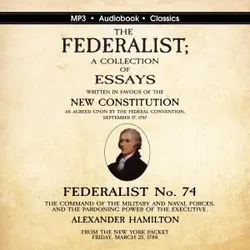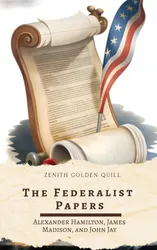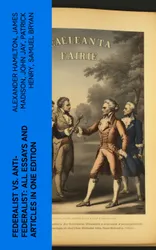In "On the Constitutionality of a National Bank," Alexander Hamilton provides a compelling exploration of the constitutional underpinnings of fiscal policy in the early United States. Written in 1791, this foundational work articulates Hamilton's vision for a strong federal government and the necessity of a national bank to stabilize the nation's economy. Employing a rigorous logical approach strongly characteristic of the Enlightenment era, Hamilton deftly navigates complex constitutional debates, weaving together historical precedents and a spirited defense of implied powers—an argument that would shape American political discourse for generations to come. As one of the Founding Fathers and the first Secretary of the Treasury, Hamilton's expertise in finance and deep commitment to a robust federal system provide invaluable context to this treatise. His experiences during the Revolutionary War, coupled with his observations of the nascent American economy, underscored his belief in the need for a centralized bank to foster economic growth and national unity, reflecting his broader intentions to establish a strong, cohesive national identity. This book is essential reading for anyone seeking to understand the roots of American financial policy and constitutional debate. Hamilton's arguments resonate today, making this work not only a historical document but also an ongoing conversation about the balance of power within the federal structure. Thus, I highly recommend this compelling treatise to scholars, students, and policymakers alike.

Federalist No. 74. The Command of the Military and Naval Forces, and the Pardoning Power of the Executive.
Alexander Hamilton
audiobook
The Federalist Papers : A Foundational Guide to American Government, Liberty, and Constitutional Law
Alexander Hamilton, James Madison, John Jay, Zenith Golden Quill
book
The Federalist Papers : Foundational Essays on Liberty, Law, and the United States Constitution
Alexander Hamilton, James Madison, John Jay, Zenith Evergreen Literary Co
book
Federalist Versus Anti-Federalist in America : Debating Democracy: The Founding Fathers' Epic Struggle for Federalism and Freedom
Alexander Hamilton, James Madison, John Jay, Patrick Henry, Samuel Bryan
book
Federalist & Anti-Federalist Papers - Complete Edition : U.S. Constitution, Declaration of Independence, Bill of Rights, Important Documents by the Founding Fathers & more
Alexander Hamilton, James Madison, John Jay, Patrick Henry, Samuel Bryan
book
The Federalist Papers : Including Declaration of Independence & United States Constitution
Alexander Hamilton, James Madison, John Jay
book
Federalist vs. Anti-Federalist: ALL Essays and Articles in One Edition : Founding Fathers' Political and Philosophical Debate, Their Opinions and Arguments about the Constitution:
Alexander Hamilton, James Madison, John Jay, Patrick Henry, Samuel Bryan
book
Federalist vs. Anti-Federalist: ALL Essays and Articles in One Edition : Founding Fathers' Political and Philosophical Debate, Their Opinions and Arguments about the Constitution:
Alexander Hamilton, James Madison, John Jay, Patrick Henry, Samuel Bryan
book
The Federalist & The Anti-Federalist Papers: Complete Collection
Alexander Hamilton, James Madison, John Jay, Patrick Henry, Samuel Bryan
book
Hamilton's Economic Policies : Works & Speeches of the Founder of American Financial System
Alexander Hamilton, Emory Speer
book
Hamilton's Economic Policies : Works & Speeches of the Founder of American Financial System
Alexander Hamilton, Emory Speer
book
Federalist Versus Anti-Federalist in America
Alexander Hamilton, James Madison, John Jay, Patrick Henry, Samuel Bryan
book
